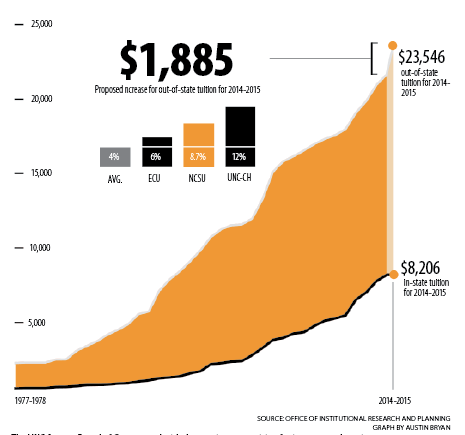The N.C General Assembly has imposed tuition increases affecting out-of-state undergraduate students for most schools in the UNC System for the 2014-2015 academic year. N.C. State, however, isn’t one of those schools, but university officials are still seeking an increase.
The General Assembly is requiring a tuition increase of 6 percent to 12.3 percent for out-of-state students, but the Board of Governors for the UNC System voted late least month to ask the legislature to repeal the mandated increase and instead set fixed rates recommended by each campus.
However, fear not, in-state students. The Board of Governors decided not to increase tuition for in-state students in 2014-2015.
N.C. State was not required by the General Assembly to increase tuition rates, but administrative officials have recommended an 8.7 percent increase in the tuition fees for undergraduate non-resident-students, increasing the fees by $1,878.
Duane Larick, senior vice provost for academic strategy and resource management, said the proposed tuition-rate increase was required in order to maintain a balance between economic value and quality.
“Because of the cut to state appropriations that we’ve seen over the last few years, $20 billion last year and additional cuts this year, it was recommended that we require an $1,800 increase,” Larick said.
Larick said the UNC System developed a plan stating that each campus should set a goal of charging tuition and fees at or above the third quartile for their peers.
“N.C. State and Winston-Salem State are the only two universities in the UNC System that is not at the third quartile, and even this increase of $1,800 does not put us at the third quartile, that tuition increase would have needed to be $4,000,” Larick said.
Larick said he doesn’t expect a serious decline in the number of out-of-state students because N.C. State will still maintain an affordable tuition rate compared with other universities in the state.
Joni Worthington, the vice president of communications for the UNC System, said most of the campuses in the system recommended an increase in tuition for out-of-state students.
“Most of the campuses would have recommended a non-resident undergraduate increase, just in most instances not as high as the legislature would have recommended,” Worthington said.
Worthington said the main reason for the increases in the tuition mandated by the General Assembly is to lower the amount of appropriated funding for the campuses.
“This is essentially a way for them to reduce appropriated funding to the campuses,” Worthington said. “The revenue that would come from the mandated increases would not go to the campuses and would go into the general fund.
“It would essentially be an offset to appropriations to the university, and it’s a way to generate revenue that would lower the amount that the state would provide to the campuses.”
Worthington also said any increases proposed by the University would go to the campus affairs and toward benefitting students.
According to Worthington, the Board of Governors has the authority to set the rate of tuition and fees for the campuses in a manner that meets campus needs.








